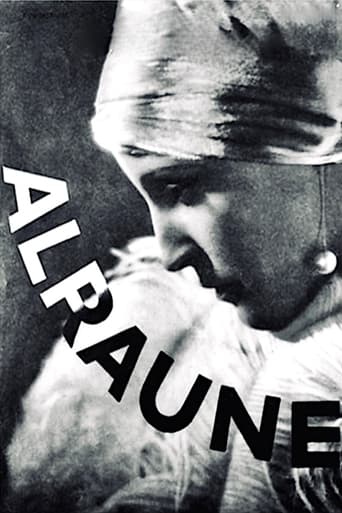

Really Surprised!
... View MoreI gave this film a 9 out of 10, because it was exactly what I expected it to be.
... View MoreIn other words,this film is a surreal ride.
... View MoreThe film's masterful storytelling did its job. The message was clear. No need to overdo.
... View MoreThere can't be a review giving this silent movie any proper judgement. One star is as possible as ten stars are since you are guessing anyway, because whatever version you watch, it is incomplete: The longest version up to date, being merged from Russian and Italian analog material, is still missing 400 m. Especially a dance performance of vanguard artist Valeska Geert is totally lost, among other scenes. And this might also explain why we don't see laboratory scenes of Alraune's making. So this movie lacks coherence, though the acting of Wegener and Helm is superb and subtle, unlike common silent movies. Still, if you are not (yet) into silent movies or Brigitte Helm's eyes, better start with one that wasn't so much tampered with. But if you'll watch this one, then you are to enjoy a great allegory about humanity being proud of a creation of its own making, then falling for it which works on the destruction of its creator.
... View MoreThere exist several versions of this "Alraune" movie, also another starring Brigitte Helm, but this very old one we have here is from 1928, so almost 90 years old and possibly the most known film. It is in black-and-white and silent and stars the aforementioned Brigitte Helm ("Metropolis") as the main character. The movie is fairly long for its time, almost runs for 110 minutes and features some of the great silent film actors. The writer and director is Henrik Galeen, who himself id known for writing the scripts and screenplay for some of the great classics from that era of German cinema. So, the premise is pretty good, but the overall outcome here is a bit disappointing I must say. The reason may be that I am not the greatest silent film fan at all, but still I felt that the plot was extremely shallow, especially for a film with such a massive runtime. There was not a single character that I really truly cared for and that includes Helm's main character as well as the minor players. I give "Alraune" a thumbs down. This one is really only worth seeing for the very biggest silent film enthusiasts. Everybody else will be as bored as I was.
... View MoreBeing a product of the Silent era, this German variation on the Frankenstein theme actually preceded the definitive James Whale pictures; a rare (the copy I acquired was culled from an old Italian TV broadcast that I somehow missed out on) and still very little-known film – despite the involvement of Henrik Galeen (THE GOLEM [1914 and 1920], NOSFERATU [1922] and THE STUDENT OF PRAGUE [1926]), Brigitte Helm (METROPOLIS [1927]) and Paul Wegener (THE STUDENT OF PRAGUE [1913], THE GOLEM [1914, 1917 and 1920] and THE MAGICIAN [1926]) – this is probably due to the fact that, in spite of some clear Expressionist trimmings, the plot is mainly treated as sophisticated melodrama! Especially disappointing for genre buffs is the fact that the creation scene is completely by-passed – shown only in a split-second flashback towards the end when Alraune (Helm, a veritable femme fatale spawned from the mandrake root by ambitious alchemist Wegener) discovers her unnatural origin when she happens upon the scientist's diary! Galeen, however, demonstrates a sure eye for pictorial detail throughout (particularly when dealing with the carnival and casino settings) and the basically 'incestuous' relationship between creature and creator is treated with amazing sensitivity and depth for its time. The ending, then, is equally non-horrific as Alraune, resigned now to her soulless existence, goes away with her creator's long-infatuated nephew while Wegener pays the price for his tampering with nature by being left all alone.
... View MoreI've just seen the world theatrical premier of the Munich Filmmuseum's restoration of this classic, presented by University of Chicago's Documentary Film Group in cooperation with Chicago's Goethe Institute and Lufthansa. Live piano accompaniment was provided by the excellent Aljoshe Zimmerman with an introduction by Stefan Drößler, director of the Filmmuseum. Zimmerman composed the score for the Filmmuseum and additionally accompanied "Nosferatu, eine Symphonie des Grauens" (also restored and presented as a double feature). The restoration was pieced together largely from surviving reels from Russia and Denmark, which focused on Alraune's mother and father, respectively. The restoration sports quite a few intertitles, in German, some of which were present in the original. Absolutely remarkable, and a must for anyone who appreciates excellent cinema.
... View More